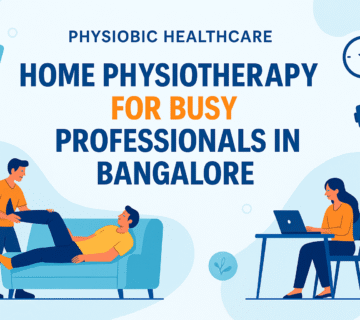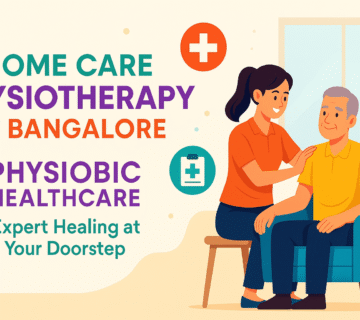Introduction
Anterior cruciate ligament (ACL) injuries are prevalent among athletes and active individuals. These injuries often require surgical intervention to restore stability and functionality to the knee. However, successful recovery is heavily dependent on effective rehabilitation, primarily facilitated through physiotherapy. At Physiobic Healthcare, we recognize the critical role of post-ACL surgery physiotherapy and offer comprehensive at-home services in Bangalore. This guide explores the significance of post-surgery physiotherapy, the myriad benefits of home-based treatment, and how Physiobic Healthcare is committed to supporting patients through their recovery journey.
Understanding ACL Injuries and Surgery
What is an ACL Injury?
The ACL is one of the key ligaments that help stabilize the knee joint. It is crucial for activities that involve sudden changes in direction, such as running, jumping, and pivoting. Injuries to the ACL can occur due to various factors, including:
- Sports Activities: High-impact sports like football, basketball, and soccer are common culprits.
- Accidents: Sudden stops, awkward landings, or direct collisions can lead to ACL tears.
- Anatomical Factors: Some individuals may have anatomical predispositions that make them more susceptible to ACL injuries.
Surgical Intervention
When conservative treatments like physical therapy and rest do not suffice, surgical reconstruction of the ACL is often the next step. This procedure typically involves:
- Graft Selection: The surgeon may use a graft from the patient’s own body (autograft) or a donor (allograft) to replace the torn ligament.
- Reconstruction Technique: Advanced surgical techniques are employed to ensure proper placement and stabilization of the graft.
Post-surgery, an effective rehabilitation program is essential for regaining strength, mobility, and overall knee function.
The Role of Physiotherapy in Recovery
Importance of Physiotherapy Post-Surgery
Physiotherapy is a cornerstone of recovery following ACL surgery. A structured rehabilitation program provides several key benefits:
- Reduce Pain and Swelling: Physiotherapy techniques such as ice application, electrical stimulation, and manual therapy can significantly alleviate post-operative pain and swelling.
- Restore Range of Motion: Early physiotherapy focuses on regaining knee mobility to prevent stiffness and promote healing. This is vital for ensuring that patients can perform daily activities without discomfort.
- Strengthen Muscles: Targeted exercises are crucial for rebuilding strength in the quadriceps, hamstrings, and surrounding muscles. Strong muscles provide better support to the knee joint.
- Improve Balance and Coordination: Physiotherapy enhances proprioception—the body’s ability to sense its position and movement—thereby improving balance and coordination. This is essential for preventing future injuries.
- Facilitate Return to Activities: A tailored rehabilitation plan prepares patients for a gradual return to sports and daily activities, ensuring they are both physically and mentally ready.
Benefits of Post-ACL Surgery Physiotherapy at Home
1. Personalized Care
At-home physiotherapy allows for a highly personalized approach. Physiotherapists can assess the home environment and tailor treatment plans that suit individual needs, preferences, and lifestyle. This personalization often leads to better engagement and commitment to the rehabilitation process.
2. Comfort and Convenience
Recovery can be physically and emotionally taxing. Receiving physiotherapy in the comfort of one’s home alleviates stress and promotes a positive healing environment. This comfort can lead to increased motivation and adherence to the rehabilitation program, as patients feel more relaxed and less anxious in familiar surroundings.
3. Family Support
Involving family members in the rehabilitation process can provide emotional support and motivation, enhancing overall recovery. Family engagement can help patients stay accountable and committed to their exercise regimens, fostering a collaborative approach to recovery.
4. Flexible Scheduling
Patients can schedule sessions at their convenience, ensuring that physiotherapy fits into their daily routine without added stress. This flexibility is especially beneficial for those balancing work, family, and other commitments, allowing for a more seamless integration of rehabilitation into daily life.
5. Continuous Monitoring
Therapists can closely monitor progress and make real-time adjustments to the treatment plan based on the patient’s response, leading to more effective outcomes. This ongoing assessment ensures that any potential setbacks are addressed promptly, keeping the recovery process on track.
6. Enhanced Communication
In a home setting, patients may feel more comfortable discussing their concerns and experiences with their physiotherapist. This open communication fosters a better understanding of the recovery process and allows for immediate feedback and adjustments to the treatment plan.
Physiobic Healthcare: Your Partner in Recovery for Post-ACL Surgery Physiotherapy at Home
Physiobic Healthcare is a leading provider of at-home physiotherapy services in Bangalore, specializing in post-ACL surgery rehabilitation. Here’s what distinguishes our services:
1. Expert Physiotherapists
Our team consists of highly qualified and experienced physiotherapists who specialize in post-operative care. They bring a wealth of knowledge in managing ACL injuries and tailor their approach to each patient’s specific needs. This expertise ensures that patients receive the best possible care throughout their recovery.
2. Comprehensive Assessment
We conduct thorough assessments during the initial consultation, considering the patient’s medical history, surgery details, and individual goals. This comprehensive evaluation allows us to design a personalized rehabilitation plan that addresses all aspects of recovery.
3. Evidence-Based Techniques
Physiobic Healthcare employs a range of evidence-based techniques, including:
- Therapeutic Exercises: Carefully designed strengthening and stretching exercises aimed at restoring knee function and enhancing overall mobility.
- Manual Therapy: Hands-on techniques to alleviate pain and improve mobility, focusing on the surrounding muscles and tissues.
- Electrotherapy: Modalities such as TENS (Transcutaneous Electrical Nerve Stimulation) and ultrasound therapy to manage pain and promote healing.
4. Patient Education
We believe in empowering patients through education. Our physiotherapists provide guidance on proper movement mechanics, pain management strategies, and self-care techniques to foster independence and confidence during recovery. This educational component is crucial for long-term success, helping patients understand their bodies and recovery process.
5. Progress Tracking
Our therapists regularly evaluate progress and modify treatment plans to ensure optimal recovery. We emphasize the importance of communication, encouraging patients to express their concerns and experiences. This collaborative approach not only improves recovery but also builds trust and rapport between the therapist and the patient.
6. Community Engagement
Physiobic Healthcare is actively involved in community outreach, educating the public about ACL injuries, prevention strategies, and the importance of timely rehabilitation. We conduct workshops and seminars to spread awareness and empower individuals with knowledge about their health.
A Typical Post-ACL Surgery Physiotherapy at Home Program
1: Initial Recovery (Weeks 1-2)
- Goals: Reduce swelling, manage pain, and restore range of motion.
- Interventions: Ice therapy, gentle passive range of motion exercises, and isometric strengthening exercises for the quadriceps. Early education on activity modification and the importance of rest is also provided.
2: Strengthening and Mobility (Weeks 3-6)
- Goals: Gradually improve strength and mobility.
- Interventions: Progressive strengthening exercises, weight-bearing activities, and balance training. Patients are introduced to functional movements that mimic daily activities.
3: Functional Training (Weeks 6-12)
- Goals: Prepare for a return to sports and daily activities.
- Interventions: Sport-specific drills, agility training, and proprioceptive exercises. Emphasis is placed on improving confidence and re-establishing a sense of normalcy in movement.
4: Return to Sport (3-6 Months)
- Goals: Achieve full strength and confidence for sports.
- Interventions: High-level functional exercises, strength conditioning, and gradual reintroduction to sports. Patients are assessed for readiness to return to their specific sports, with focus on injury prevention strategies.
Conclusion
Post-ACL surgery rehabilitation is crucial for a successful recovery. At Physiobic Healthcare, we are dedicated to providing comprehensive at-home physiotherapy services in Bangalore that empower patients to achieve their recovery goals. With a focus on personalized care, expert therapists, and evidence-based practices, we aim to enhance the recovery experience for individuals recovering from ACL injuries.
If you or a loved one is recovering from ACL surgery, don’t wait to start your rehabilitation journey. Contact Physiobic Healthcare today to schedule a consultation and discover how our at-home physiotherapy services can facilitate your recovery. Experience the comfort of personalized care and take the first step towards a healthier, active life!



